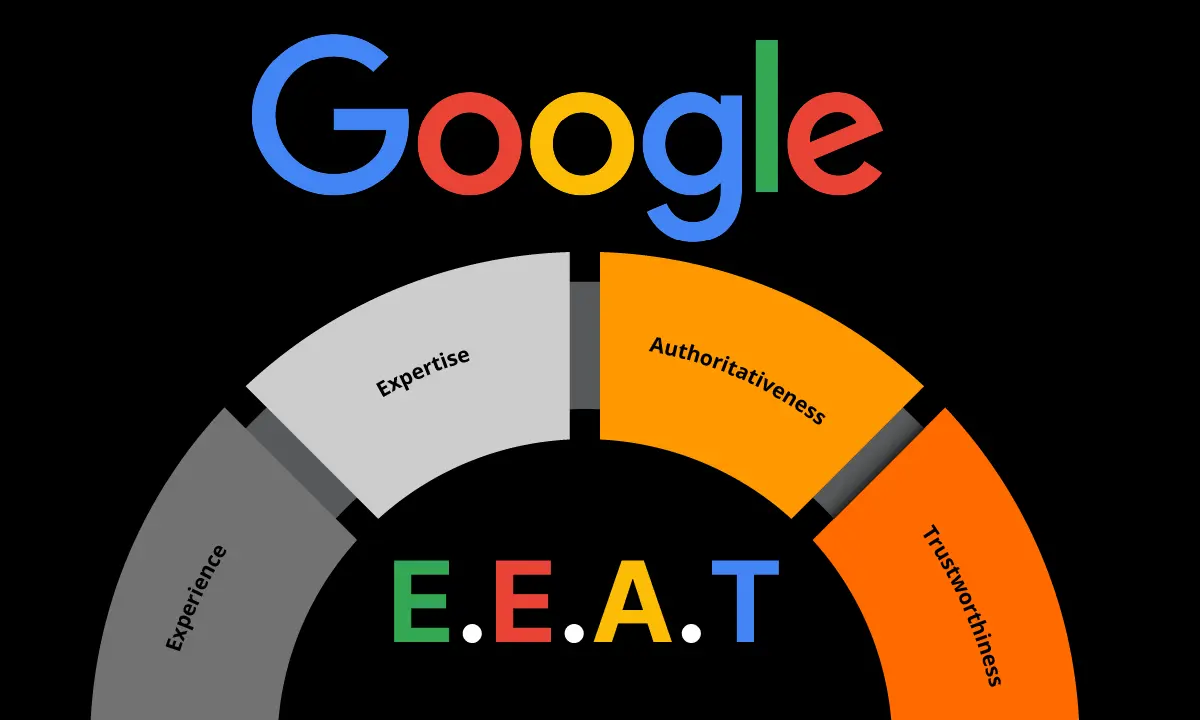What Is Google EEAT and Why Is It Important?
If you are in a position that requires creating, posting, and updating website content, you might have heard a thing or two about Google EEAT. Depending on the industry you’re in or the subject your site’s content talks about, Google EEAT can be a major factor in how Google views your site, values it, and determines who sees your site. Utilizing expert SEO services, content marketing strategies, and professional copywriting can enhance your adherence to Google EEAT principles, ensuring your content meets quality standards and reaches its intended audience effectively.
Understanding Google EEAT
Before we get into exactly what a Google EEAT score represents and what it means for your website, it’s important to remember exactly why Google exists in the first place. Google has one job: to help its users find valuable information. That’s it. Every Google update, product, or service rolled out by the Silicon Valley behemoth is done so with the intention that it’ll help connect users with the most relevant and topical information anywhere on the Internet. To do this, Google relies on what’s commonly called Google EEAT (as well as a billion other variables…but let’s take this one step at a time).
What is Google EEAT?
Google E-E-A-T stands for “Experience – Expertise – Authoritativeness – Trustworthiness,” four intertwined variables that weigh heavily on your site’s organic rankings. When you post informative content on your site, you must present it in a way that demonstrates your first-hand experience and expertise in the field, your authority to present on the subject, and the credentials that qualify you as a trusted voice on the topic.
Importance of Google EEAT in SEO
Contrary to popular belief, there is no such thing as a quantifiable “Google EEAT score.” Instead, it’s a more general way of looking at your site’s content related to Google’s algorithms. The more experience, expertise, authoritativeness, and trustworthiness your site delivers, the more likely you are to rank. But what does that mean exactly?
Breakdown of Google EEAT Components

Experience
When evaluating the content on your site, Google looks for signs that you (or whoever is writing your content) are a subject matter expert. Showcasing your first-hand, direct experience via author biographies, behind-the-scenes content, or referencing real personal experiences. For example, you run a fitness site and post a regular blog about diet and exercise. In that case, your posts are more likely to reach a wider audience if written by a certified personal trainer or licensed dietician. The author should be linked to a detailed biography page or have credentials and experience outlined in a bio section below the article.
Expertise
In addition to showing your first-hand experience, your content must demonstrate your subject matter expertise. This can be done by creating content that dives deep, exploring concepts in a more detailed way, supported by accurate, reputable sources and studies. If you are a medical organization writing about a new disease treatment, citing sources like the Centers for Disease Control, U.S. Department of Health and Human Services, official research organizations like the American Cancer Society, and more.
Authoritativeness
This one is less about the author specifically and more about the site as a whole. Is your site known as the “go-to” for a particular subject? Is it referenced and linked to by industry experts and influencers? Build your site’s authority by becoming a go-to resource in your industry. Encourage guest blogging, collaborations with influencers, and references from reputable sites. For instance, a tech blog with contributions from industry leaders will establish greater authority.
Trustworthiness
Unfortunately, you can’t believe everything you read online (we hope this isn’t the first you’ve heard of this). For this reason, Google aims to present content its users can rely on. For example, it will rank reputable news sources higher than fringe or conspiracy outlets for media-related searches. For health and wellness content, it will rank science-backed columns higher than blogs promoting unproven remedies and concoctions. To prove your site’s trustworthiness, it is best to be transparent and factual in your published content and link to reliable sources where appropriate.
Topics Application of Google EEAT in YMYL (Your Money Your Life) Content
The four components of EEAT weigh especially high for website content relating to happiness, health, safety, or financial stability. This type of content is known as “Your Money Your Life” (YMYL). For example, a blog about nutrition might rank higher if it’s written by a nutritionist or medical professional. On the other hand, if you’re writing a travel blog, you don’t necessarily have to be a travel agent or vacation planner by trade. Likewise, if you are creating blogs or videos on how to crochet stuffed animals, simply having the expertise and skills to teach others is a sufficient show of expertise.
What factors affect Google EEAT?
Is this a perfect system? Of course not. Are you bound to find questionable and demonstratively false information in your Google searches? You bet, but the EEAT concept aims to make these instances as rare as possible for users. It is designed to give users information they can trust by leaning more heavily on the most credible content. EEAT is a guideline for human quality raters to evaluate the quality of the overall search results, not a direct ranking factor in Google’s search algorithm. However, Google uses the EEAT evaluation data to improve algorithms, so adhering to these guidelines can positively impact your website’s search performance over time.
Boosting Your Site’s EEAT
Fortunately, there are several ways you can boost your site’s EEAT and draw more credibility in the eyes of Google, ultimately boosting organic search performance. Let’s talk about a few of them:
Backlinks

Backlinks from reputable sites signal to Google that your content is valuable and is one of the most tangible ways Google can tell whose content is worth promoting. After all, no one wants their site to link to garbage content. So, when you craft an excellent piece of industry-related content, promote it! The more pages that link to your site, the better.
Reviews
Positive reviews enhance your site’s credibility. Positive reviews prove that people are engaging with your site and can rely on the products, services, and information you provide your consumers and site visitors. They provide transparency and authenticity to your content. Encourage satisfied customers to leave reviews on Google and other review platforms. For example, an e-commerce site can follow up with customers post-purchase to request a review.
Trustworthy Content
Arguably, the most important thing you can do to boost your site’s EEAT is to focus on creating high-quality, factual content. Conduct thorough research, have your content reviewed by experts, and cite reliable sources. For instance, a blog post on health tips should be reviewed by a medical professional and link to scientific studies. Be transparent about who is writing your content and what credentials they bring. If you’re not producing content that your users can rely on and that establishes you as a trusted voice in your industry, then nothing else matters.
Google EEAT & SEO
How EEAT Influences SEO?
While EEAT is not a direct ranking factor, it influences many aspects of SEO. Google’s algorithms consider EEAT signals to assess content quality and relevance. Instead, Google relies on signals it can measure to assign value to your content. Variables within your site and your site’s content (backlinks, reviews, word counts, keywords, traffic, etc.) are evaluated within Google’s mysterious algorithm to determine how your site ranks organically. Google EEAT, like the SEO universe as a whole, involves an ever-changing effort of optimizing and tweaking how your content is presented to get Google to take notice.
Boosting your Google EEAT is not something you will knock out in a day or see results overnight. It requires developing and maintaining a solid content strategy, constant monitoring and revision of content, and a vast knowledge of how Google looks at and evaluates content. It’s a lot of work, and there is no finish line. Even if you’re ranking #1, your competition actively seeks to knock you off that pedestal.
Questions to Assess Your Content’s EEAT
Although there’s no real checklist to follow, there are some questions you can ask yourself to gauge whether or not your content is helpful and reliable. Here are just a few of the review questions you can ask:
- Does the content provide a complete, comprehensive description of the topic?
- Is it offering insightful analysis or more interesting information beyond the obvious?
- Does the main heading or page title offer a helpful summary of the content, or is it too exaggerated, like clickbait?
- Are there spelling or stylistic issues?
- Is it produced well, or does it read sloppy and rushed?
- Does the content provide clear sourcing, expert involvement, information about the author, or other credible support to establish trust?
- Will someone leave the page feeling like they’ve learned about the topic?
- Are you mainly summarizing what’s already been said without adding additional value?
In addition to asking these questions yourself, request other trusted individuals not affiliated with your site to review the content and offer honest opinions. For more questions and content assessment thoughts, check out Google’s tips for creating reliable, people-first content.
The Impact of Google EEAT in the Rise of AI Content
A wealth of new artificial intelligence (AI) technologies has made it easy for companies to generate a lot of content. While AI can be useful, use it cautiously, as it could create content opposing EEAT principles.
AI Content & EEAT Principles
AI cannot prove any first-hand, real-life experience or evaluate an experience based on human feelings. It’s only performing its best imitation. Chatbots may also appear to know a lot (at least based on what’s been evaluated in their databases), but the advice and information are only given based on training, not what has been researched and practiced. It should never be used as a replacement for an expert, as it can (and has) created fake information or citations to support its argument. AI could prove authoritativeness, but it’s unclear whether or not an AI-cited search result will pass authority to the recipient. Finally, because Google places the most importance on trustworthiness, AI is unlikely to surpass humans in this regard. Publishers are responsible for providing a factual, accurate, and positive user experience. If tempted to use AI, they are encouraged to disclose any use of AI-generated content due to trust issues (although not required to do so now).
Currently, Google is not opposing or prohibiting AI content, but it cannot be used to manipulate search engine rankings. Google doesn’t appear to be concerned with the prospect of AI-generated content flooding results with low-quality, incorrect information, as it’s confident that the trained Quality Raters can distinguish this content to deliver only high-quality results to users. However, if the AI content is considered high quality, it could be rewarded with a higher ranking, but chances are, you’ll need a human to tweak it to get it there.
Partner with Timmermann Group for EEAT-Compliant Content
If your business creates digital content, it’s essential to understand Google EEAT, especially if you want your content to populate in search and be viewed as valuable and reliable. Creating high-quality content can also be a heavy undertaking that most businesses don’t have the time to invest in, but that’s where we come in.
Partner with Timmermann Group to ensure your content adheres to Google EEAT standards. At Timmermann Group, we pride ourselves on our expertise in producing high-quality content that meets and exceeds EEAT standards. We will help you craft compelling, authoritative, and trustworthy content that resonates with your audience and ranks well in search engines. Contact us today to discuss your business goals and how we can help you achieve them.

